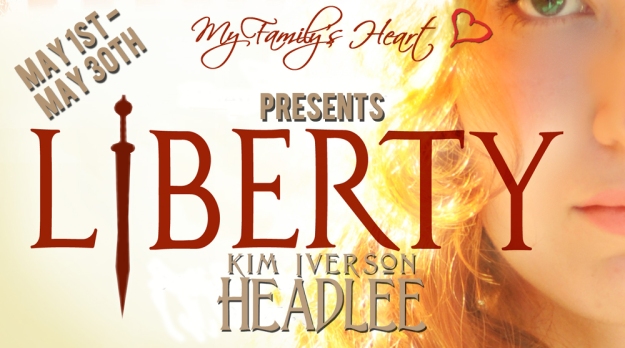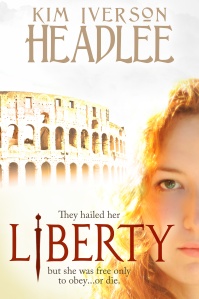
BOOK INFORMATION
TITLE – Liberty, second edion AUTHOR – Kim Iverson Headlee
GENRE – Historical Romance (ancient Rome) PUBLICATION DATE – Dec. 2014
LENGTH (Pages/# Words) – 462 pages/118K words
PUBLISHER – Pendragon Cove Press
COVER ARTIST – Natasha Brown
BOOK INFO – hp://kimiversonheadlee.blogspot.com/p/liberty.html
BOOK SYNOPSIS
They hailed her “Liberty,” but she was free only to obey—or die.
Betrayed by her father and sold as payment of a Roman tax debt to fight in Londinium’s arena, gladiatrix-slave Rhyddes feels like a wild beast in a gilded cage. Celc warrior blood flows in her veins, but Roman masters own her body. She clings to her vow that no man shall claim her soul, though Marcus Calpurnius Aquila, son of the Roman governor, makes her yearn for a love she believes impossible.
Groomed to follow in his father’s footsteps and trapped in a polically advantageous betrothal, Aquila prefers the purity of combat on the amphitheater sands to the sinister intrigues of imperial polics, and the raw power and athlec grace of the flame-haired Libertas to the adoring deference of Rome’s noblewomen.
When a plot to overthrow Caesar ensnares them as pawns in the dark design, Aquila must choose between the Celc slave who has won his heart and the empire to which they both owe allegiance. Knowing the opposite of obedience is death, the only liberty

offered to any slave, Rhyddes must embrace her arena name—and the love of a man willing to sacrifice everything to forge a future with her.
BUY & TBR LINKS
Kindle US – Kindle UK – Kindle CA – Kindle AU – Amazon Paperback – Nook – Inktera (Page Foundry) – iTunes – Kobo – Scribd – Smashwords – Goodreads
 EXCERPT
EXCERPT
FINGERS CRAMPING AND shoulders aching from having wielded the pitchfork all day, Rhyddes ferch Rudd tossed another load of hay onto the wagon. Sweat trickled down her back, making the lash marks sng. Marks inflicted by her father, Rudd, the day before because eighteen summers of anguish had goaded her into speaking her mind.
Physical pain couldn’t compare with the ache wringing her heart.


She slid a glance toward the author of her mood. He stood a few paces away, leaning upon his pitchfork’s handle in the loaded wagon’s shade to escape the July heat as he conversed with her oldest brother, Eoghan. She couldn’t discern their words, but their camaraderie spoke volumes her envy didn’t want to hear.
Her father’s gaze met hers, and he lowered his eyebrows. “Back to work, Rhyddes!” On Rudd’s lips, her name sounded like an insult.
In a sense, it was.
Her name in the Celc tongue meant “freedom,” but the horse hitched to the hay wagon enjoyed more freedom than she did. Her tribe, the Votadini, had been conquered by the thieving Romans, who demanded provisions for their troops, fodder for their mounts, women for their beds, and coin to fill the purses of every Roman who wasn’t a soldier.
If those condions weren’t bad enough, for all the kindness her father had demonstrated during her first two decades, Rhyddes may as well have been born a slave.
She scooped up more hay. Resentment-fired anger sent wisps flying everywhere, much of it sailing over the wagon rather than landing upon it.
“Hey, mind what you’re doing!”
Owen, her closest brother in age and in spirit, emerged from the wagon’s far side, hay prickling his hair and tunic like a porcupine. Rhyddes couldn’t suppress her laugh. “’Tis an improvement. Just wait ll the village lasses see you.”
“Village lasses, hah!” Sporng a wicked grin, Owen snatched up a golden fisul, flung it at her, and dived for her legs.
They landed in the fragrant hay and began vying for the upper hand, cackling like a pair of witless hens. When Owen thought he’d prevailed, Rhyddes twisted and rolled from underneath him. Her fresh welts stung, but she refused to let that deter her. He lost his balance and fell backward. She pounced, planng a knee on his chest and pinning his wrists to the ground over his head.
Victory’s sweetness lasted but a moment. Fingers dug into her shoulders, and she felt herself hauled to her feet and spun around. Owen’s face contorted to chagrin as he scrambled up.
“Didn’t get enough of the lash yestermorn, eh, girl?” Rudd, his broad hands clamped around her upper arms, gave her a teeth-raling shake.
When she didn’t respond, he released her and rounded on Owen. “As for you—”

“Da, please, no!” Rhyddes stopped herself. Well she knew the fulity of pleading with Rudd. Sll, for Owen’s sake, she had to try. Her father’s scowl dared her to connue. She swallowed the lump that had formed in her throat. “’Twas not Owen’s fault. I—” Sweat freshened the sng on her back, and she winced. “The fault is naught but mine.”
“Aye, that I can well believe.” Rudd grasped each sibling by an arm and strode across the hayfield toward the family’s lodge. “Owen can watch you take his lashes as well as yours. We’ll see if that won’t mend his ways.” The thin linen of her ankle-length tunic failed to shield her from his fingers, which had to be leaving bruises. Rhyddes gried her teeth. Rudd seemed disappointed. “I doubt anything in this world or the next will make you mend yours.”
“You don’t want me to change. You’d lose your excuse to beat me.” Sheer impernence, she knew, but she no longer cared.
“I need no excuses, girl.”
The back of his hand collided with her cheek. Pain splintered into a thousand needles across her face. She reeled and dropped to her hands and knees, her hair obscuring her vision in a copper cascade. Hay pricked her palms. Owen would have helped her rise, but their father restrained him. Owen blistered the ground with his glare, not daring to direct it at Rudd for fear of earning the same punishment.
Not that Rhyddes could blame him.
Rudd yanked her up, cocked a fist… and froze. “Raiders!”
Rhyddes whirled about. Picts were charging from the north to converge upon their selement, the bale cries growing louder under the merciless aernoon sun. One of the storage buildings had already been set ablaze, its roof thatch marring the sky with thick black smoke.
Rudd shed his shock and sprinted for the living compound, calling his children by name to help him defend their home: Eoghan, Ian, Bloeddwyn, Arden, Dinas, Gwydion, Owen.
Every child except Rhyddes.
She ran to the wagon, unhitched the horse, found her pitchfork, scrambled onto the animal’s back, and kicked him into a jolng canter. The stench of smoke strengthened with each stride. Her mount pinned back his ears and wrestled her for control of the bit, but she bent the frightened horse to her will. She understood how he felt.
As they loped past the cow byre, a Pict leaped at them, knocking Rhyddes from the horse’s back. The ground jarred the pitchfork from her grasp. The horse galloped toward the pastures as Rhyddes fumbled for her dagger. Although her brothers had taught her how to wield it in a fight, unl now she’d used it only to ease dying animals from this
world.
But the accursed blade wouldn’t come free of the hilt.
Sword alo, the Pict closed on her.
Time distorted, assaulng Rhyddes with her aacker’s every detail: lime-spiked hair, weird blue symbols smothering the face and arms, long sharp sword, ebony leather boots and leggings, breastplate tooled to fit female curves . . .
Female?
The warrior-woman’s sword began its descent.
From the corner of her eye Rhyddes saw her pitchfork. Grunng, she rolled toward it, praying to avoid her aacker’s blow.
Her le arm stung where the sword grazed it, but she snagged her pitchfork and scrambled to her feet. Unexpected eagerness flooded her veins.
As the Pict freed her weapon from where it had embedded in the ground, Rhyddes aimed the pitchfork and lunged. The nes hooked the warrior-woman’s sword, and Rhyddes twisted with all her strength. The Pict yelped as the sword ripped from her hand to go flying over the sty’s fence. Squealing in alarm, the sow lumbered for cover, trying to wedge her bulk under the trough.
With a savage scream, the warrior-woman whipped out a dagger and charged. Rhyddes reversed the pitchfork and jammed its bu into the Pict’s gut, under the breastplate’s boom edge, robbing her of breath. She reversed it again and caught the raider under the chin with the pitchfork’s nes. As the woman staggered backward, flailing her arms and flashing the red punctures that marred her white neck, Rhyddes struck hard and knocked her down.
The warrior-woman looked heavier by at least two stone, but Rhyddes pinned her chest with her knee. She dropped the pitchfork and grasped her dagger, yanking it free. Grabbing a fisul of limed hair, she wrestled the woman’s head to one side to expose her neck.
The Pict bucked and twisted, trying to break Rhyddes’s grip. ’Twas not much different than wrestling a fever-mad calf.
Rhyddes’s de slice ended the threat.
Blood spurted from the woman’s neck in sickening pulses.
Rhyddes stood, panng, her stomach churning with the magnitude of what she’d done. ’Twas no suffering animal she’d killed—and it could have been her lying there, pumping her lifeblood into the mud.

Bile seared her throat, making her gag. Pain lanced her stomach. Bent double, she retched out the remains of her morning meal, spaering the corpse.
Aer sping out the last bier mouthful and wiping her lips with the back of her hand, she drew a deep breath and straightened. As she turned a slow circle, her senses taking in the sights and sounds and stench of the devastaon surrounding her, she wished she had not prevailed.
The news grew worse as she sprinted toward the lodge.
Of her seven brothers, the Picts had le Ian and Gwydion dead, her father and Owen wounded, the lodge and three outbuildings torched. She ran a fingerp over the crusted blood of her scratch, and she couldn’t suppress a surge of guilt.
Mayhap, she thought through the blinding tears as she ran to help what was le of her family, ’twould have been beer had she died in the Pict’s stead.
The surviving raiders were galloping toward the tree line with half the cale. The remaining stock lay sffening in the fields, already aracng carrion birds.
Three days later, the disaster aracted scavengers of an altogether different sort.
REVIEW
Liberty is a captivating novel with so many variables that make it a true masterpiece. Our main character Rhyddes, which translates to mean Freedom daughter of Red (thus Liberty), is sold off to the Romans due to a tax debt. Here she must fight in the Gladiator arena. Fortunately Rhyddes fights well, it’s that ancient Celtic warrior blood that runs through her veins that makes her fierce. Although Rhyddes is plagued with captivation and yearning for the Roman governor’s son, Aquila. He too is irresistibly drawn to Rhyddes and vows to renounce his wealth and power for her. The charm of this novel kept me intrigued from the start. The savagery, ferocity coupled with the longing and purity of true love makes Liberty a captivating must read!
CHARACTER BIOS
I am Rhyddes ferch Rudd, which in your tongue means Freedom daughter of Red. The blood of ancient Celc warriors flows in my veins, though I am a farmer’s daughter by the circumstance of my birth. My life spans much of the reign of the Roman Emperor Marcus Aurelius, one of a very few men ever to claim that tle who did not abuse his power for personal gain—but I care not who rules and who dies in this gods-cursed empire.
More than anything—even more than my freedom—I yearn to be my lover Aquila’s equal. As a foreign slave in an empire where cizenship stands paramount, where an arena fighter such as I can only be considered the equal of other gladiators, actors, undertakers, and whores, this goal seems impossibly remote. Although Aquila is the son of a powerful Roman, he has declared that he would renounce his aristocrac status, wealth, and power for me, but I cannot in good conscience allow him to destroy himself on my account.


And yet the gods have granted the impossible to other mortals. I pray that I am worthy to receive such a boon from them, for surely divine assistance is the only way for Aquila and I to bridge the vast social chasm that separates us from enjoying a future together.
 AUTHOR BIO
AUTHOR BIO
Kim Headlee lives on a farm in southwestern Virginia with her family, cats, goats, and assorted wildlife. People & creatures come and go, but the cave and the 250-year-old house ruins—the laer having been occupied as recently as the mid-20th century—seem to be scking around for a while yet.
Kim is a Seale nave (when she used to live in the Metro DC area, she loved telling people she was from “the other Washington”) and a direct descendent of tweneth-century Russian nobility. Her grandmother was a childhood friend of the doomed Grand Duchess Anastasia, and the romanc yet tragic story of how Lydia escaped Communist Russia with the aid of her American husband will most certainly one day fuel one of Kim’s novels. Another novel in the queue will involve her husband’s ancestor, the seventh-century proto-Viking king of the Swedish colony in Russia.
For the me being, however, Kim has plenty of work to do in creang her projected 8-book Arthurian series, The Dragon’s Dove Chronicles, and other novels under her new imprint, Pendragon Cove Press.
FOLLOW KIM
BLOG – NEWSLETTER – TWITTER – GOOGLE+ – FACEBOOK – PINTEREST – AMAZON AUTHOR PAGE – GOODREADS – LINKEDIN – YOUTUBE CHANNEL
GIVEAWAY PRIZES
– 5 e-copies of Liberty – 10 note cards
– 1 autographed print copy of Liberty
Tour Organized & Hosted By


40.771874
-73.949741










